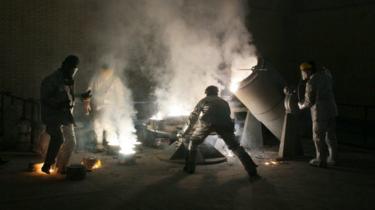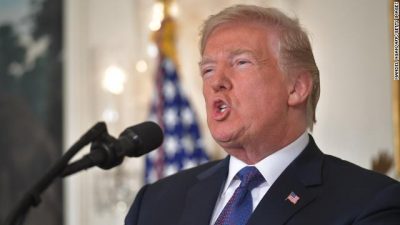Iran nuclear deal: Trump pulls US out
US President Donald Trump says he will withdraw the US from an Obama-era nuclear agreement with Iran.
Calling it “decaying and rotten”, he said the deal was “an embarrassment” to him “as a citizen”.
Going against advice from European allies, he said he would reimpose economic sanctions that were waived when the deal was signed in 2015.
In response, Iran said it was preparing to restart uranium enrichment, key for making both nuclear energy and weapons.
Iran’s President Hassan Rouhani said: “The US has announced that it doesn’t respect its commitments.
“I have ordered the Atomic Energy Organisation of Iran to be ready to start the enrichment of uranium at industrial levels.”
He said he would “wait a few weeks” to speak to allies and those who were committed to the nuclear deal.
“All depends on our national interests,” he said.
In a statement, France, Germany and the UK – who are also signatories to the deal – have said they “regret” the American decision.
The European Union’s top diplomat, Federica Mogherini, said the EU was “determined to preserve” the deal.
But Israel’s Prime Minister Benjamin Netanyahu says he “fully supports” Mr Trump’s “bold” withdrawal from a “disastrous” deal.
Mr Trump had previously complained that the deal only limited Iran’s nuclear activities for a fixed period; had failed to stop the development of ballistic missiles; and had handed Iran a $100bn (£74bn) windfall that it used “as a slush fund for weapons, terror, and oppression” across the Middle East.

Starker than expected
Analysis by Sebastian Usher, BBC Arab Affairs editor
All the signatories of the Iran deal, except for the US, have been in favour of keeping it in some form.
After weeks of trying to dissuade President Trump, they pretty much knew what was coming.
But the announcement may have been even starker than they expected, with Mr Trump making clear that the full weight of sanctions would be reimposed, allowing little or no wriggle room.
This leaves any foreign companies trying to do business with Iran in a difficult position.
And it will make it even harder for leaders like the French President Emmanuel Macron to salvage the deal, despite committing themselves before and after the announcement to persevere with it.

What was agreed under the deal?
The so-called Joint Comprehensive Plan of Action (JCPOA) saw Iran agree to limit the size of its stockpile of enriched uranium – which is used to make reactor fuel, but also nuclear weapons – for 15 years and the number of centrifuges installed to enrich uranium for 10 years.
Iran also agreed to modify a heavy water facility so it could not produce plutonium suitable for a bomb.
 Image copyrightGETTY IMAGES
Image copyrightGETTY IMAGESIn return, sanctions imposed by the UN, US and EU that had crippled Iran’s economy were lifted.
The deal was agreed between Iran and the five permanent members of the UN Security Council – the US, UK, France, China and Russia – plus Germany.
Iran insists its nuclear programme is entirely peaceful, and its compliance with the deal has been verified by the International Atomic Energy Agency (IAEA). (BBC)


